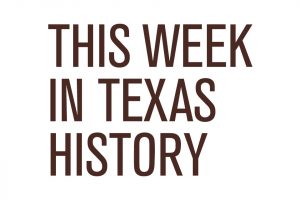The Dallas Morning News in the July 27, 1918 issue endorsed William P. Hobby for governor with an editorial cartoon showing a tight-lipped Texan casting his ballot “for law and order.”
The illustration was a none too subtle slap at the colorless incumbent’s challenger, “Farmer Jim” Ferguson who had been removed from office the previous year. The endorsement of the Big D daily made it a clean sweep among the major newspapers in the state for the disgraced ex-governor’s replacement.
Ten months earlier, Will Hobby became governor by default after the legislature evicted the flamboyant Ferguson from the executive mansion. Most Texans dismissed the publisher from Beaumont as just a caretaker with little chance of keeping the job.
But the winds of change sweeping across the Lone Star State transformed Hobby into a formidable politician with a loyal personal following. In short order, he solidified the support of prohibitionists, women and the Mexican minority.
Hobby was still learning his way around the governor’s mansion in the fall of 1917, when the ban-the-booze bunch began making noises about substituting one of their own for the lifelong “wet.” The secretary of war added fuel to the fire by threatening to send the thousands of troops training in Texas somewhere else unless the doughboys were protected from liquor and prostitution.
Hobby responded in February 1918 by calling the legislature into special session for the patriotic purpose of “improving camp surroundings.” His act forbidding the sale of alcohol within ten miles of any military base was swiftly passed.
Exploiting their advantage, “dry” zealots went the governor one better by ramming through the first statewide prohibition bill in Texas history. Though opposed to mandatory abstinence, Hobby signed the legislation into law.
The second item on his historic agenda was a clever compromise that provided for the partial enfranchisement of women. By permitting the deprived gender to participate in party primaries, Hobby assured himself a huge bloc vote come July.
Hobby’s dramatic about-face on the liquor issue left two prohibitionist opponents dead in the water. Singing the praises of the born-again governor, attorney general B.F. Looney and railroad commissioner Earle Mayfield dropped out of the race.
That left Jim Ferguson, who had not taken his unprecedented removal from office lying down. Less than a month after returning to private life, he started a weekly newspaper that carried his message to every corner of the state.
Farmer Jim, actually a banker by trade, used the November 1917 dismissal of the outstanding criminal charges against him to drive home the point that his impeachment had been purely political. Later that same month, he announced his intention to retake the reins of government from the interloper Hobby.
Confident of a favorable ruling, key advisors begged the governor to go to court to keep Ferguson off the ballot. But Hobby rightfully refused, insisting the decision belonged to the people.
By April 1918, the Ferguson campaign was in high gear and picking up steam. In a move to merge his devoted rural base with urban blue-collar workers, Jim not only came out for labor unions but also publicly vilified big-name businessmen like John Kirby, a former contributor. The East Texas timber tycoon answered in kind by demanding the defeat of “James E. Ferguson, criminal and bastard.”
The challenger then turned on his mild-mannered foe with surprising savagery. Making cruel fun of Hobby’s short stature and enormous ears, he branded him “a misfit whom God had failed to endow with the physical attributes that make up a man.”
Campaign strategists warned Hobby that if he stuck to the high road, his election was in doubt. They encouraged him to repeat the unfounded rumor that the mysterious $156,000 loan which caused Ferguson’s downfall had come from a German lobby.
Knowing the allegation to be utterly false, Hobby balked at injecting gutter gossip into the already heated campaign. However, as concern grew that Ferguson was closing fast, he too implied that his adversary’s generous benefactor was none other than the German-American Alliance.
In a grandstand play for the Valley vote, Hobby held a border summit with the governor of Coahuila. The gesture guaranteed a strong Mexican turnout and more than offset the boxes that Ferguson’s old friend Archie Parr would stuff on his behalf.
The size and scope of the Hobby victory amazed even his most optimistic backers. He plowed under Farmer Jim at the polls by a better than 2-to-1 margin and in the process carried 234 of the 254 counties.
But anyone who thought Jim Ferguson was finished in politics had another think coming. Until his dying day 26 years later, he would always be the wild card in the Texas deck.
Don’t miss out! Signed copies of Bartee’s book “Texas Depression-Era Desperadoes” are going fast! Order today at barteehaile.com or mail a check for $26.65 to “Bartee Haile,” P.O. Box 152, Friendswood, TX 77549.






